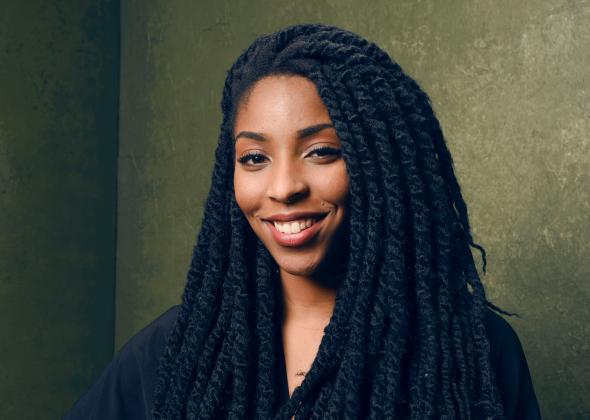Should Jessica Williams be the next host of The Daily Show? Lots of fans think so. More than 14,000 of them have signed a Change.org petition to get Comedy Central to hire Williams as Jon Stewart’s successor. Many saw a gag in Hot Tub Time Machine 2, in which Williams hosts The Daily Show in 2025, as an omen. So when Williams announced on Sunday night that she didn’t want the job, it was to be expected that disappointment would ensue. What wasn’t expected was a fierce debate about impostor syndrome, leaning in, and the perils of commenting on celebrities’ life choices.
Here is how Williams announced her lack of interest in the Daily Show hosting gig:
Twitter’s 140-character limit doesn’t always allow for maximum clarity, and these tweets are a bit confusing. Williams’ first tweet said she was “under-qualified,” but the second and third tweets implied that the issue was not so much her credentials as her disposition. Williams seemed to be saying that she didn’t feel she had the metabolism and expertise to be able to do the job well.
But it was the “under-qualified” comment that caught the eye of Billfold writer Ester Bloom, who used Williams’ tweet as a peg for a post about the lack of diversity in late-night comedy and the impostor syndrome that afflicts many young women in the workplace. Impostor syndrome typically involves feeling unqualified for work that one is, in fact, very well qualified to do, and Bloom saw signs of it in Williams’ tweet:
You can almost hear all the old white people who benefit from the status quo nodding their approval. We did it, they whisper. We have succeeded in instilling in yet another competent, confident young woman a total lack of understanding of her own self-worth! We didn’t even need to undermine her; we gave her the tools and she undermined herself. Well done all. Good show. Let’s play eighteen holes and then hit up Hooters for lunch.
Jessica Williams, respectfully, I reject your humility. What on earth does “under-qualified” mean when it comes to being a comedian? You’re smart, you’re funny, you’re self-possessed. Is there something I’m missing? …
All Williams needs is a pep talk. Get Luvvie in a room with her, and Jazmine, and Amy Poehler and Lena Dunham. Get Paul Feig in there too, and Ta-Nehisi Coates, and George R. R. Martin. Get her the best Lean In group of all time. She will emerge as from a funeral pyre, naked and coiled in dragons, ready to lead.
I confess that when I first read Bloom’s post, though the tone of the piece rankled, I mostly agreed with it. I am familiar with the concept of impostor syndrome and have found it useful as a way of conceptualizing my own professional insecurities. (And I’ve been surprised to learn that lots of women who have reached objectively impressive professional milestones also often feel fraudulent.) I also think the almost universally white male face of late night reflects shamefully on the entertainment industry, and I really like Jessica Williams and think it would be awesome if she hosted The Daily Show. “Under-qualified” be damned! If fans and Comedy Central executives think you’re qualified to host The Daily Show, then you’re qualified.
But Williams didn’t see the Billfold post that way, and she told Bloom as much in a series of tweets:
Her comments raise a broader point that’s too often lost in a media landscape that fetishizes skyrocketing young careers more than ever: It’s perfectly OK for young people to feel like they need more time to learn how to do something. In campaigning for Williams to be hired as the next host of The Daily Show, some fans have tried to cast her as an ambassador for women of color, busting through glass ceilings for the benefit of all. No one can live up to that kind of pressure. (And if Williams is the only obvious black female candidate for the Daily Show gig, that doesn’t mean she’s obligated to accept it, needless to say—it means Comedy Central needs to look harder for black female candidates.)
Williams’ star will, I hope, continue to rise for a long time, and people will continue to discuss her career as a barometer of changing norms. Hopefully they’ll do it in a way that’s respectful and that acknowledges the fact that Williams is a human being with her own life goals. But being famous almost always means losing control of the narrative of your career, and when you’re forced to mean so many things to so many people, you seem to lose control even faster. It goes without saying that Williams should be able to make professional choices based on what she feels is right for herself, not what other people expect of her. The fact that lots of young women underestimate their professional competence doesn’t mean that Williams herself suffers from impostor syndrome—and it doesn’t mean that a 25-year-old needs to be thrust into a job recently vacated by a 52-year-old just because she is extraordinarily good.
